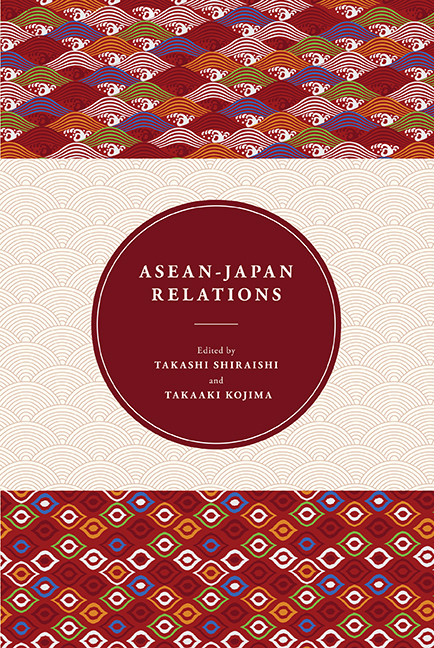Book contents
- Frontmatter
- Contents
- Preface
- About the Contributors
- 1 An Overview of Japan-ASEAN Relations
- 2 Japan's Relations with ASEAN
- 3 Approaches toward Regionalism: Japan, China and the Implications on ASEAN
- 4 The New Japan-ASEAN Partnership: Challenges in the Transformation of the Regional Context in East Asia
- 5 ASEAN-Japan Strategic Partnership and Regional Integration: Impacts and Implications
- 6 ASEAN-Japan Cooperation on Maritime Non-Traditional Security Issues: Toward a New Paradigm
- 7 Japan's Evolving Security Concerns in Maritime Southeast Asia: From Safety of Navigation to “Lake Beijing”
- 8 Evolution of Institutions and Policies for Economic Integration in East Asia: The Rise of China and Changes in the Regional Order
- 9 Managing Integration in East Asia: Behind Border Issues in Japan-ASEAN Trade Agreements
- 10 Regional Financial Cooperation in East Asia: Development and Challenges
- 11 Japanese Development Assistance to ASEAN Countries
- 12 Japanese Foreign Direct Investment in the ASEAN-4 Countries
- 13 Japan's Triple Tsunami
- 14 ASEAN-Japan Relations: A Singapore Perspective
2 - Japan's Relations with ASEAN
Published online by Cambridge University Press: 21 October 2015
- Frontmatter
- Contents
- Preface
- About the Contributors
- 1 An Overview of Japan-ASEAN Relations
- 2 Japan's Relations with ASEAN
- 3 Approaches toward Regionalism: Japan, China and the Implications on ASEAN
- 4 The New Japan-ASEAN Partnership: Challenges in the Transformation of the Regional Context in East Asia
- 5 ASEAN-Japan Strategic Partnership and Regional Integration: Impacts and Implications
- 6 ASEAN-Japan Cooperation on Maritime Non-Traditional Security Issues: Toward a New Paradigm
- 7 Japan's Evolving Security Concerns in Maritime Southeast Asia: From Safety of Navigation to “Lake Beijing”
- 8 Evolution of Institutions and Policies for Economic Integration in East Asia: The Rise of China and Changes in the Regional Order
- 9 Managing Integration in East Asia: Behind Border Issues in Japan-ASEAN Trade Agreements
- 10 Regional Financial Cooperation in East Asia: Development and Challenges
- 11 Japanese Development Assistance to ASEAN Countries
- 12 Japanese Foreign Direct Investment in the ASEAN-4 Countries
- 13 Japan's Triple Tsunami
- 14 ASEAN-Japan Relations: A Singapore Perspective
Summary
Japan has, for many years, held a position of transcendental importance for the Association of Southeast Asian Nations, or ASEAN, as well as for its member countries.
INSTITUTIONAL LINKAGES
In December 2003, the leaders and foreign ministers of Japan and the ten-nation ASEAN gathered in Tokyo to “commemorate” 30 years of ASEAN-Japan relations. It was the first time that ASEAN leaders had met outside of Southeast Asia. At that “Commemorative Summit”, according to a Japanese government summary, Japanese “Prime Minister Junichiro Koizumi clearly stated that Japan would continue to regard its relationship with ASEAN as very important and confirmed that Japan and ASEAN should further develop their relations as sincere and open partners that ‘act together, advance together.’”
Indonesia's President Megawati Soekarnoputri, speaking for all of ASEAN, pointed out:
In the past three decades, ASEAN and Japan have developed a mutually beneficial partnership and cooperation which continue to deepen and widen. Let me reaffirm that the ASEAN-Japan long-standing relations and cooperation have contributed significantly to the peace and prosperity of the people in Southeast Asia as well as in the wider region of East Asia and the Asia-Pacific.
Although our relationship is in a good state, nevertheless the dynamic global and regional environments require ASEAN and Japan to work together even more closely. Globalization and greater interdependence among countries in the world presented ASEAN and Japan with new opportunities and new challenges.
Megawati continued:
Japan has been and will continue to be the most important economic partner of ASEAN. We therefore agreed to develop a broad-based economic partnership underpinned by the ASEAN-Japan Comprehensive Economic Partnership Agreement to develop deeper understanding among our people.
At their summit meeting in Phnom Penh in November 2012, the ASEAN states agreed to Japan's proposal for another Commemorative Summit in December 2013, or ten years after the first one. At their summit in November 2002, also in Phnom Penh, the Japanese and ASEAN leaders had declared their intention to conclude a “framework” for an ASEANJapan Comprehensive Economic Partnership (AJCEP) agreement, which they concluded in October 2003 in Bali. In April 2008 Japan and all ten ASEAN member-states completed the signing of the AJCEP agreement, which covered trade in goods, trade in services, investments, economic cooperation, and dispute settlement.
- Type
- Chapter
- Information
- ASEAN-Japan Relations , pp. 17 - 37Publisher: ISEAS–Yusof Ishak InstitutePrint publication year: 2013

